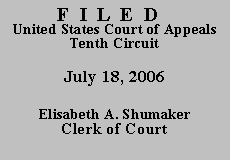

| DARLENE SCHMIDT, |
|
| v. | |
| RICK HARDMAN,IRS Territory Manager; SHIRLEY COOPER AUGILAR, Tax Payer Advocate Manager, |
Factual and Procedural Background
Ms. Schmidt alleges that in September, October, and November of 2005, the IRS wrongfully deducted $100 from her Social Security payments to satisfy income taxes owed from 1991. She claims that she owes no back taxes because she has not worked since 1982, and that she tried unsuccessfully to get help from both the IRS and the Taxpayer Advocate Service to resolve the mistake.
Ms. Schmidt filed a pro se civil rights complaint under 42 U.S.C. §§ 1983 and 1985, alleging violations of the Fourth, Fifth, Sixth, Eighth, and Fourteenth Amendments, as well as violations of a state criminal statute. The district court granted her application to proceed in forma pauperis and denied her Motion for Service of Process and Motion to Appoint Counsel. Under 28 U.S.C. § 1915(e)(2)(B)(ii), the district court found that Ms. Schmidt had failed to state a claim for which relief may be granted. The district court dismissed the case because Ms. Schmidt alleged no facts sufficient to establish any of her legal claims. Ms. Schmidt filed a Motion for Rehearing and Amending the Complaint, and the court granted the Motion to Amend. However, despite the amended complaint, the district court again dismissed for failure to state a claim. Ms. Schmidt now appeals the dismissal.
Discussion
We review de novo the district court's decision to dismiss under § 1915 (e)(2)(B)(ii) for failure to state a claim. Gaines v. Stenseng, 292 F.3d 1222, 1224 (10th Cir. 2002). "Dismissal of a pro se complaint for failure to state a claim is proper only where it is obvious that the plaintiff cannot prevail on the facts he has alleged and it would be futile to give him the opportunity to amend." Perkins v. Kan. Dept. of Corrections, 165 F.3d 803, 806 (10th Cir. 1999). We assume the truth of every "plausible factual allegation, even if it lacks evidentiary support." Hall v. Bellmon, 935 F.2d 1106, 1109 (10th Cir. 1991). A pro se litigant's pleadings are construed liberally and held to a less stringent standard than formal pleadings by a lawyer. Id. at 1110.
We have reviewed Ms. Schmidt's brief and the record below, and agree with the district court that Ms. Schmidt's amended complaint did not cure any of the deficiencies that the district court found. Most of her legal claims have nothing to do with the factual allegations of the complaint. As the district court held, 42 U.S.C. § 1983 applies to state rather than federal actors, 42 U.S.C. § 1985 to claims of racial discrimination, the Fourth Amendment to searches and seizures, the Sixth Amendment to the rights of the accused in a criminal case, the Eighth Amendment to cruel and unusual punishment, and Fourteenth Amendment to state action. The complaint raises no issues relevant to these legal provisions. Nor may Ms. Schmidt, as a private citizen, sue a federal officer under provisions of the state criminal code.
As to the Fifth Amendment, we may assume that the plaintiff is invoking rights under the Due Process Clause, but despite being given a second chance to file an intelligible complaint, Ms. Schmidt's complaint sets forth no allegations from which we can discern a due process argument. To the extent that Ms. Schmidt wishes to contest her tax liability, she must pursue her remedies under the Internal Revenue Code. A constitutional lawsuit for damages against Internal Revenue Service employees cannot substitute for a proper challenge to the assessment and enforcement of tax liability.
The judgment of the United States District Court for the District of Utah is therefore AFFIRMED.
Entered for the Court,
Michael W. McConnell
Circuit Judge
*.After examining the briefs and appellate record, this panel has determined unanimously that oral argument would not materially assist in the determination of this appeal. See Fed. R. App. P. 34(a)(2); 10th Cir. R. 34.1(G). This case is therefore submitted without oral argument. This order and judgment is not binding precedent, except under the doctrines of law of the case, res judicata, and collateral estoppel. The court generally disfavors the citation of orders and judgments; nevertheless, an order and judgment may be cited under the terms and conditions of 10th Cir. R. 36.3.